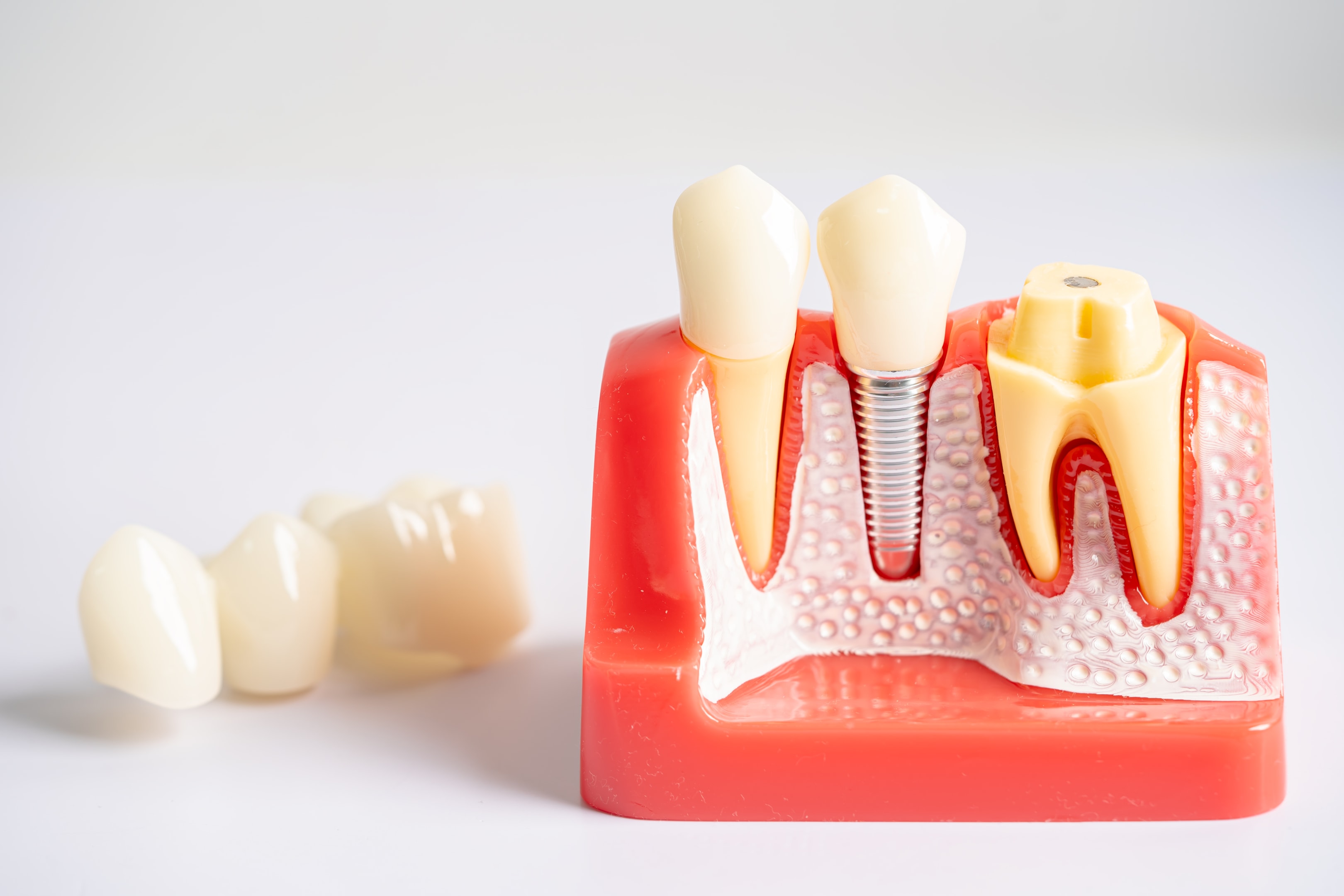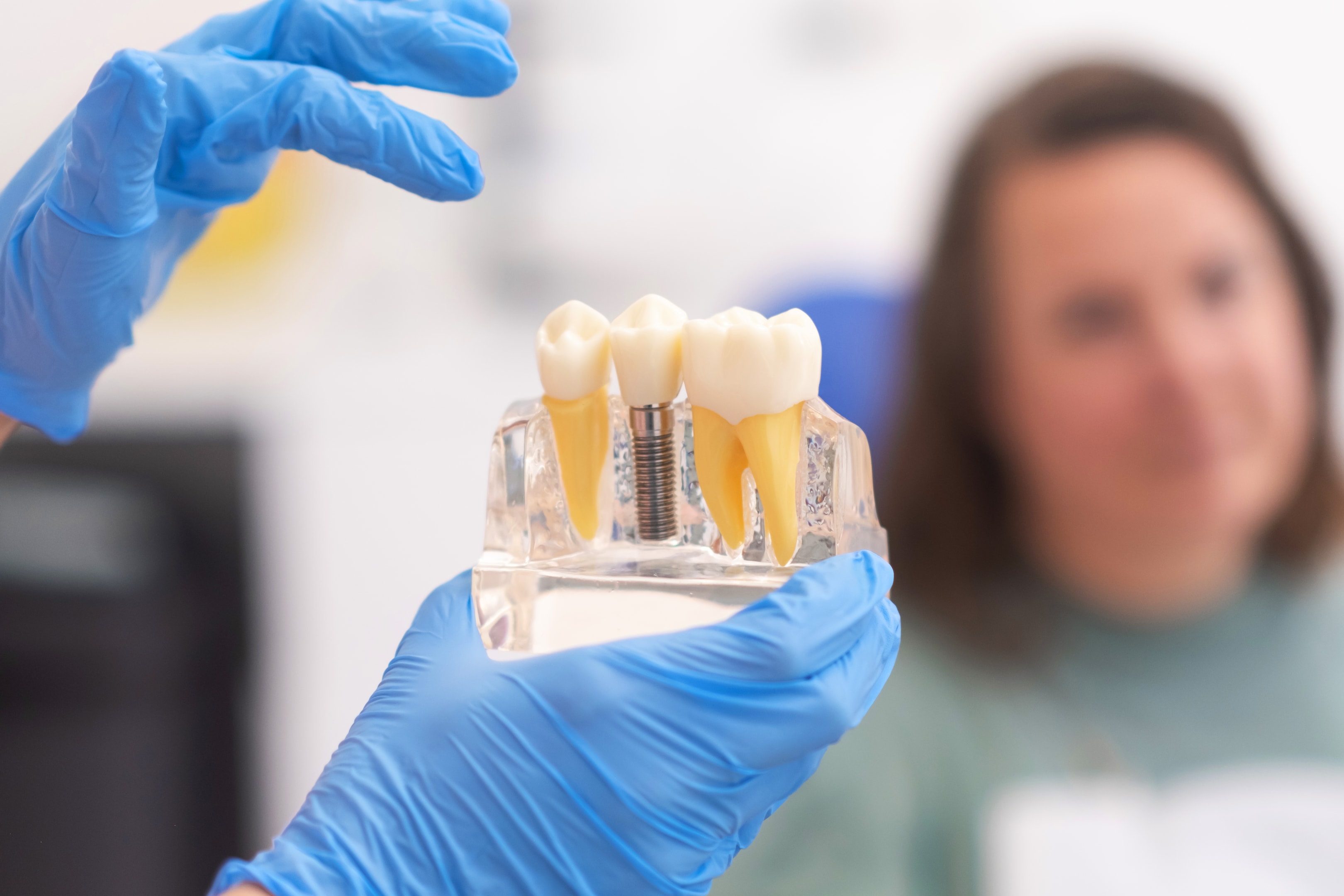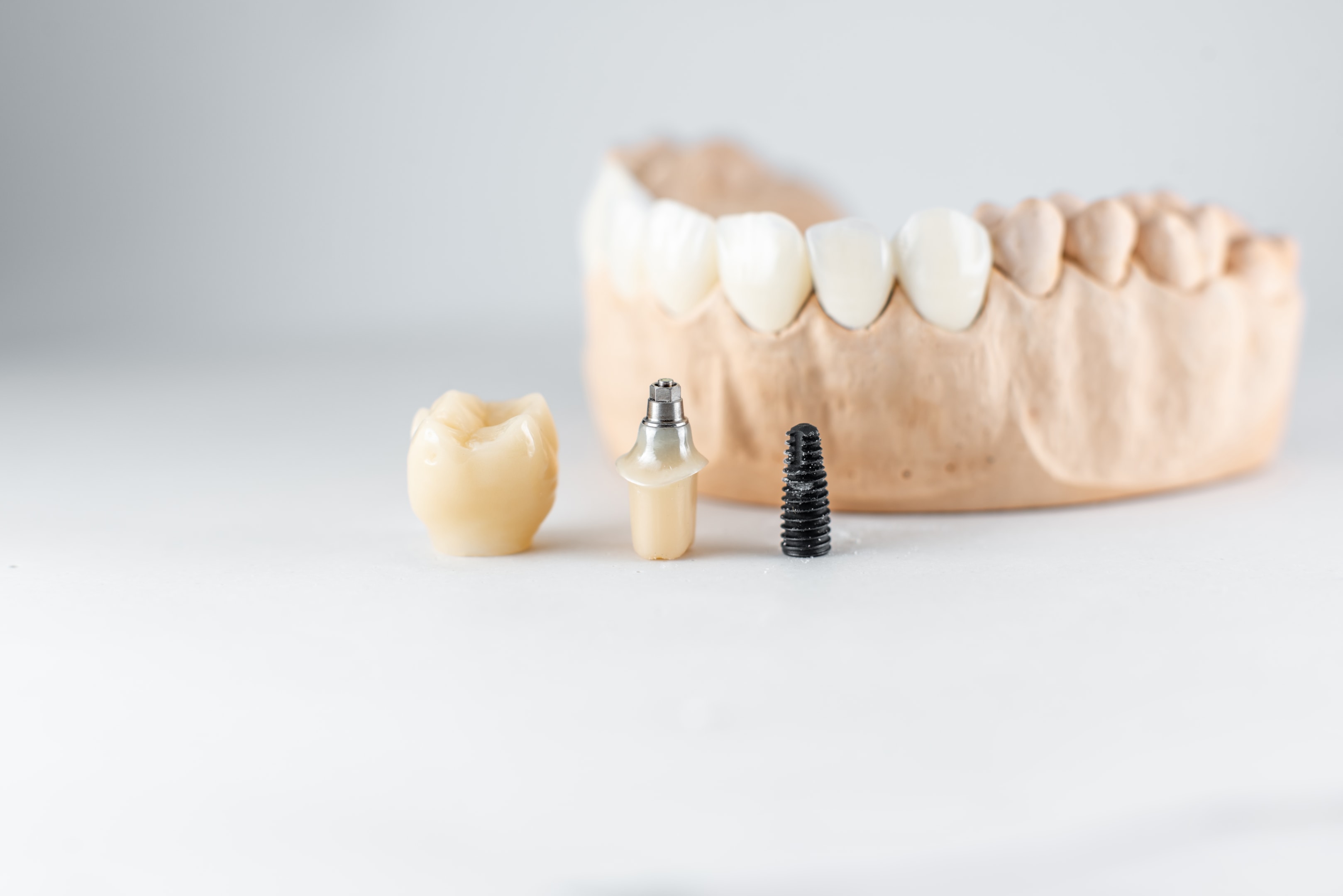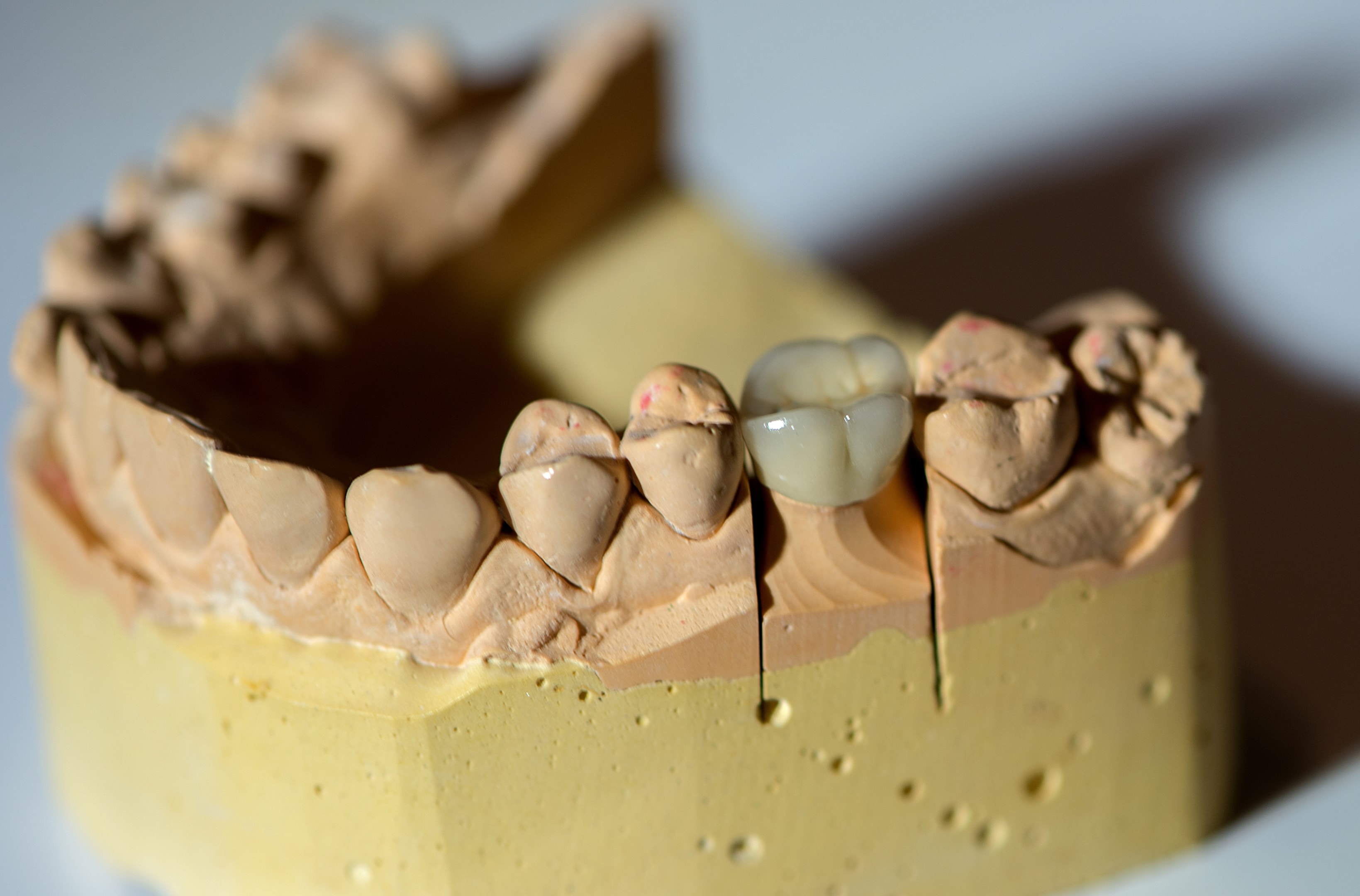


When it comes to restoring your smile, the choice between a dental implant and a crown can feel like being stuck between a rock and a hard place.
With so many options and opinions, it’s hard to know which route to take. Don’t worry, we’ve got your back.
In this post, we’ll unravel the mysteries of dental implants and dental crowns, helping you make an informed decision about your dental health.

Imagine your mouth as a house. The teeth are the walls, and just like in a house, sometimes walls need repair.
Dental implants and crowns are two effective ways to fix or replace these “walls,” ensuring your house stands strong and looks great.
In this blog, we’ll explore what dental implants and dental crowns are, what they treat, and which might be the best option for your situation.
What is a Dental Implant?

A dental implant is a surgical component that interfaces with the bone of the jaw or skull to support a dental prosthesis such as a crown, bridge, denture, or facial prosthesis. The dental implant procedure involves several stages and can take up to 6 to 12 months to complete, addressing missing teeth or other dental problems.
Understanding the Dental Implant Procedure
A dental implant is like the foundation of a new wall in your house. Dental implant surgery involves the surgical placement of a titanium post into your jawbone, acting as a root for a replacement tooth. Over time, the implant fuses with the bone, providing a stable base for an artificial tooth, or crown, to be attached.

Why Choose a Dental Implant?
Dental implants are ideal for replacing missing teeth. Dental implants require a surgical procedure and a healing period before the crown can be attached. They offer a permanent solution that looks, feels, and functions like a natural tooth. According to the Canadian Academy of Implant Dentistry, dental implants have a success rate of up to 98%, making them a reliable choice.

Practical Tip: If you’re missing one or more teeth and want a long-lasting solution, a dental implant might be your best bet. It’s especially beneficial if you want to prevent bone loss in your jaw, which can occur with missing teeth.
What is a Crown?

A dental crown is a cap that is placed over a tooth to restore its size, shape, strength, and appearance. Crowns are used to protect weak teeth, restore broken teeth, and even support teeth with large fillings. Additionally, dental crowns can hold dental bridges in place, cover misshaped or discolored teeth, and cover dental implants. A permanent crown is placed over the tooth or implant as the final restoration.
The Crowning Glory
A dental crown is like a protective cap for your existing tooth. It covers and restores the shape, size, strength, and appearance of a damaged tooth. Crowns can be made from various materials, including porcelain, metal, or a combination of both, and are custom-made to blend seamlessly with your natural smile.

Why Choose a Crown?
Crowns are typically used to protect a weak tooth, restore a broken tooth, or cover a tooth with a large filling when there isn’t enough tooth left. They’re also used to cover dental implants, root canals, and cosmetic modifications.

Practical Tip: If your tooth is damaged but still largely intact, a crown can be an excellent choice. It’s a less invasive option compared to dental implants and can effectively preserve your natural tooth structure.
Dental Implant vs Crown: What They Treat

A dental implant is a surgical component that interfaces with the bone of the jaw or skull to support a dental prosthesis such as a crown, bridge, denture, or facial prosthesis. Crowns, on the other hand, are caps placed over a tooth to restore its shape, size, strength, and appearance. A dental implant replaces an entire tooth, including the root, and is generally used to replace missing teeth or heavily damaged teeth that cannot be repaired using other techniques.
When to Choose a Dental Implant
Dental implants are best for cases where the entire tooth is missing. Whether due to injury, decay, or congenital conditions, implants fill the gap left behind and prevent adjacent teeth from shifting.

When to Choose a Crown
Crowns are suited for teeth that are still present but damaged. They’re great for teeth that have been chipped, cracked, or severely decayed but have healthy roots. Crowns do not require the same considerations for the jaw bone as implants do.

Practical Tip: Consider your current dental situation. If you have a missing tooth, a dental implant is the way to go. If you have a damaged tooth that needs reinforcement, a crown will do the trick.
Which is Better for Different Situations?

When considering dental treatments, it’s essential to compare dental implants vs crowns to determine the best option for your specific needs. Factors such as cost, longevity, purpose, and suitability based on tooth condition, budget, and recovery time should be taken into account. Consulting with a dentist can help you decide the most suitable treatment option.
For Single Tooth Replacement: Dental Implant
If you’ve lost a single tooth, a dental implant offers a standalone solution without affecting adjacent teeth. It also helps maintain bone structure and facial aesthetics.

For Damaged Teeth: Crown
When your tooth is damaged but still present, a crown provides the necessary protection and restores function. It’s less invasive and can be completed faster than an implant.

Practical Tip: Evaluate the condition of your teeth. For missing teeth, implants provide a comprehensive solution. For damaged but present teeth, crowns offer protection and restoration.
Advantages of Having Dental Implants Done by an Oral Surgeon

Choosing to have dental implants done by an oral surgeon can significantly improve the success rate of the procedure. Oral surgeons have specialized training and experience in placing implants, which can lead to better outcomes and fewer complications. Additionally, maintaining good oral health is crucial for successful implant outcomes.
Expert Hands, Optimal Results
At Mahogany Oral Surgery, we believe that dental implants should be handled by experts. Oral surgeons have specialized training in surgical procedures and are well-versed in the complexities of the jawbone and oral structures. This expertise ensures that your implant is placed with precision, reducing the risk of complications and improving long-term success.

The Calgary Connection
Our team at Mahogany Oral Surgery, located in SE and SW Calgary, AB, is dedicated to providing top-notch care for our community. We understand the unique needs of our patients and are committed to delivering personalized treatment plans.
Practical Tip: Choose an oral surgeon for your dental implants to ensure you receive the highest standard of care. Their specialized training can make a significant difference in the outcome of your procedure.
Conclusion: Making the Right Choice for Your Smile

Choosing between a dental implant and a crown doesn’t have to be daunting. By understanding the purpose and benefits of each option, you can make an informed decision that best suits your dental needs. Whether you’re dealing with missing teeth or damaged teeth, there’s a solution that can restore your smile and boost your confidence.

Key Takeaways:
- Dental implants are ideal for replacing missing teeth, providing a permanent, natural-looking solution.
- Crowns are best for protecting and restoring damaged teeth, preserving your natural tooth structure.
- Your choice between a dental implant and a crown depends on the condition of your teeth and your specific dental needs.
- Opting for an oral surgeon for your dental implants can ensure precise placement and optimal results.

At Mahogany Oral Surgery, we’re here to guide you through the process and help you achieve a healthy, beautiful smile. Remember, your smile is your best accessory—make sure it shines bright with the right dental care!
Feel free to visit us at Mahogany Oral Surgery for more information or to schedule a consultation. We’re here to serve the SE and SW Calgary communities with the best in oral surgery and dental care.



